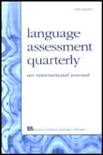
Language Assessment Quarterly
Scope & Guideline
Exploring New Horizons in Language Evaluation
Introduction
Aims and Scopes
- Validity and Reliability in Language Assessment:
The journal consistently emphasizes the importance of validity arguments in language testing, exploring various methodologies to ensure that assessments accurately measure what they intend to. - Innovations in Language Testing Technology:
There is a strong focus on the integration of technology in language assessment, including the use of automated scoring systems and technology-mediated testing environments. - Dynamic and Formative Assessment Approaches:
The journal promotes dynamic assessment frameworks, emphasizing the role of formative assessment in enhancing learning outcomes and the assessment process. - Assessment Fairness and Justice:
The exploration of fairness and justice in assessment practices is central, addressing issues of bias, accessibility, and the implications of assessment decisions on diverse learner populations. - Interactional Competence Assessment:
Research on assessing interactional competence, including speaking and listening, is a core area, reflecting the growing recognition of communication skills in language proficiency.
Trending and Emerging
- AI and Machine Learning in Assessment:
There is a significant increase in the exploration of AI and machine learning applications in language assessment, focusing on automated scoring and personalized learning experiences. - Technology-Enhanced Language Assessment:
The integration of technology in assessment practices, including remote proctoring and digital platforms, is trending as a response to the demands of contemporary educational contexts. - Research on Learner Engagement:
Emerging studies are focusing on test-taker engagement and experiences, emphasizing the importance of understanding how learners interact with assessment tools and processes. - Transdisciplinary Perspectives in Assessment:
There is a growing trend towards incorporating transdisciplinary perspectives in language assessment, drawing from social theories and various academic disciplines to enrich assessment practices. - Dynamic Assessment and Learner-Centric Approaches:
Dynamic assessment, which emphasizes learner potential and adaptability, is increasingly recognized as a vital approach, reflecting a shift towards more formative and responsive assessment methodologies.
Declining or Waning
- Traditional Language Assessment Methods:
There is a noticeable decline in studies focusing solely on traditional assessment methods, such as standardized tests, as the field shifts towards more innovative and integrated approaches. - Focus on Specific Language Skills:
Research concentrating exclusively on isolated language skills (e.g., reading or writing) without a holistic view of language proficiency is becoming less common, with a trend towards integrated assessments. - Static Assessment Models:
Static models of assessment, which do not account for learner variability and context, are waning as the field increasingly embraces more dynamic and adaptable assessment strategies.
Similar Journals
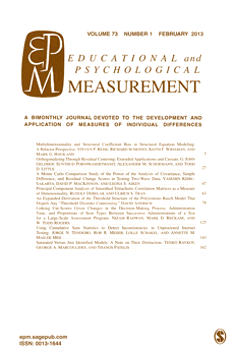
EDUCATIONAL AND PSYCHOLOGICAL MEASUREMENT
Connecting Theory and Practice in MeasurementEDUCATIONAL AND PSYCHOLOGICAL MEASUREMENT, published by SAGE Publications Inc, is a premier journal serving as a vital resource for researchers and practitioners in the fields of educational and psychological assessment. With a rich history dating back to 1941, this esteemed journal encompasses a wide-ranging scope, exploring the intricacies of measurement techniques and their implications within applied mathematics, psychology, and education. Notably categorized in Q1 quartiles across various fields, including Applied Mathematics and Educational Psychology, the journal ranks impressively in Scopus, reflecting its high impact and relevance—ranked #82/635 in Applied Mathematics and #232/1543 in Education. The journal’s commitment to advancing knowledge in educational measurement equips scholars with essential insights and methodologies, making it an essential tool for advancing scholarly inquiry and practice. With no open access limitations, EDUCATIONAL AND PSYCHOLOGICAL MEASUREMENT is dedicated to disseminating quality research that influences educational practices and psychological evaluation, thus reinforcing its esteemed position within academia.

LANGUAGE LEARNING & TECHNOLOGY
Exploring the Future of Language EducationLANGUAGE LEARNING & TECHNOLOGY, published by the University of Hawaii's National Foreign Language Resource Center, stands as a pioneering platform within the realms of linguistics, education, and computer science applications. With an impressive impact factor and esteemed rankings—achieving Q1 in Education and Q1 in Linguistics and Language—this open-access journal has been disseminating critical research since its inception in 1997. The journal operates under a commitment to fostering innovative approaches to language learning through technology, making it invaluable for researchers, educators, and practitioners seeking to enhance their understanding of this dynamic intersection. Hailing from the United States, the journal not only promotes scholarly dialogue but also champions accessibility to knowledge, ensuring that the latest advancements in language learning and technology are readily available to a global audience. With converged years documented from 1997 to 1998 and from 2000 to 2021, LANGUAGE LEARNING & TECHNOLOGY continues to play a pivotal role in shaping contemporary discussions around language education and the influence of technology on learning methodologies.
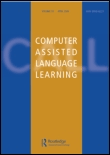
Computer Assisted Language Learning
Advancing Research in Computer-Assisted Language LearningComputer Assisted Language Learning is a prestigious journal dedicated to the interdisciplinary field of language education technology, published by Routledge Journals, Taylor & Francis Ltd. With its ISSN 0958-8221 and E-ISSN 1744-3210, the journal has become a cornerstone for researchers and practitioners interested in the innovative integration of computer technology in language learning processes. As of 2023, it holds an impressive impact factor, ranking Q1 in both Computer Science Applications and Linguistics and Language categories, indicating its significance within these scholarly domains. The journal covers a wide array of subjects, including language acquisition, educational technology, and instructional design, facilitating an understanding of how digital tools can enhance language learning experiences. Its rigorous editorial standards ensure that published articles undergo thorough peer review, making it a highly respected platform for disseminating cutting-edge research. With an extensive publication history dating back to 1990 and an ongoing commitment to exploring the dynamics of language learning in digital contexts, this journal is essential for academics, educators, and students alike who are looking to stay at the forefront of research in computer-assisted language education.
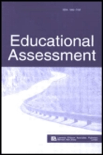
Educational Assessment
Driving Change in Assessment MethodologiesEducational Assessment is a prestigious journal dedicated to the latest advancements and research in the field of education, with a particular focus on the evaluation and assessment practices that shape educational policies and student outcomes. Published by Routledge Journals, Taylor & Francis Ltd, this influential journal boasts an impressive Q1 rating in Education for 2023, highlighting its critical role in disseminating high-quality research. With an ISSN of 1062-7197 and an E-ISSN of 1532-6977, Educational Assessment has been a vital resource for scholars and practitioners since its inception, spanning from 1993 to 1995 and again from 2004 to 2024. Researchers in this field can utilize findings published in this journal to inform best practices, influence pedagogical techniques, and drive improvements in assessment methodologies. Although it is not an Open Access journal, Educational Assessment is recognized for its rigorous peer-review process and valuable contributions to the education landscape, making it an essential read for anyone interested in educational research and assessment strategies.

Papers in Language Testing and Assessment
Elevating Language Assessment StandardsPapers in Language Testing and Assessment, published by the ALTAANZ-ASSOC LANGUAGE TESTING & ASSESSMENT AUSTRALIA, is a premier open access journal dedicated to the field of language testing and assessment. This journal serves as a vital platform for researchers, educators, and professionals who aim to share innovative research findings, methodologies, and practical applications in language evaluation. With a commitment to enhancing the quality of language assessment practices, the journal focuses on diverse topics including psychometrics, test design, and the impact of assessment on language learning contexts. Although the journal's HIndex and Scopus ranks are currently unspecified, its emphasis on peer-reviewed articles ensures the dissemination of high-quality research. By providing open access to its publications, Papers in Language Testing and Assessment aims to facilitate widespread distribution of knowledge, fostering collaboration and professional growth within the language testing community.

INTERNATIONAL JOURNAL OF SELECTION AND ASSESSMENT
Enhancing decision-making in business and beyond.INTERNATIONAL JOURNAL OF SELECTION AND ASSESSMENT, published by Wiley, is a leading academic journal dedicated to the exploration and advancement of selection and assessment methodologies across various fields, including applied psychology, business, management, and innovation. With an impressive convergence of research from 1993 to 2024, the journal holds a prestigious standing in Q2 in Applied Psychology and Q1 in several disciplines including Business, Management, and Accounting, showcasing its commitment to high-quality, impactful research. The journal is ranked notably within Scopus rankings, with a 66th percentile rank in General Psychology and a 64th percentile in General Business, Management, and Accounting, reflecting its significance and influence within the academic community. By providing a platform for rigorous empirical research, theoretical discussions, and practical insights, the INTERNATIONAL JOURNAL OF SELECTION AND ASSESSMENT is essential for researchers, professionals, and students aiming to deepen their understanding and application of selection and assessment techniques in a rapidly evolving global landscape.
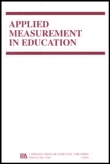
APPLIED MEASUREMENT IN EDUCATION
Enhancing learning outcomes with innovative measurement strategies.Applied Measurement in Education is a prestigious journal published by Routledge Journals, Taylor & Francis Ltd, dedicated to advancing the fields of education and developmental psychology. Established in 1988, the journal has played a critical role in disseminating research and theoretical perspectives related to assessment, measurement practices, and educational outcomes. With an impressive standing in the academic community, it is categorized in the Q2 quartile for Developmental and Educational Psychology and the Q1 quartile for Education as of 2023. It ranks #654 out of 1543 in Social Sciences - Education and #203 out of 360 in Psychology - Developmental and Educational Psychology. Though not an Open Access journal, it provides essential insights for educators and policymakers wishing to harness measurement tools for improved educational practice. With a focus on empirical research, theoretical frameworks, and practical applications, Applied Measurement in Education serves as a vital resource for researchers, professionals, and students dedicated to enhancing the effectiveness and fairness of educational assessments.
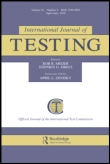
International Journal of Testing
Transforming Knowledge Through Rigorous Testing InsightsThe International Journal of Testing, published by Routledge Journals, Taylor & Francis Ltd, stands as a pivotal source of knowledge in the realms of education, modeling and simulation, and social psychology. With an ISSN of 1530-5058 and an E-ISSN of 1532-7574, this esteemed journal is recognized for its commitment to advancing the understanding of testing methodologies and their applications across diverse fields. Currently classified in the Q1 category for both Education and Modeling and Simulation, and Q2 for Social Psychology, it maintains a significant impact, ranking 434th among 1543 journals in Educational Social Sciences. The journal fosters high-quality research discussions, providing a platform for researchers, professionals, and students to share innovative insights and findings. Although it is not open access, the journal ensures that groundbreaking studies are disseminated widely to contribute to ongoing academic discourse until 2024 and beyond. With its headquarters in the United Kingdom at 2-4 Park Square, Milton Park, Abingdon OX14 4RN, Oxon, England, the International Journal of Testing continues to be an invaluable resource for anyone involved in testing theory and practice.
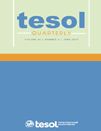
TESOL QUARTERLY
Shaping Language Learning with Empirical ExcellenceTESOL Quarterly, published by Wiley, is a premier academic journal in the fields of Education and Linguistics, noted for its significant contributions to the study of Teaching English to Speakers of Other Languages. Since its inception in 1981, this journal has established itself as a vital platform for researchers and educators, emphasizing empirical studies, innovative teaching practices, and critical reviews that inform policy and pedagogy. With an impressive impact factor, it consistently ranks in the Q1 Quartile across multiple categories in both Education and Linguistics, highlighting its influence and reach within the scholarly community. The journal boasts strong Scopus rankings, placing it in the top 96th percentile among related publications, further affirming its essential role in disseminating cutting-edge research. Although it does not offer open access, TESOL Quarterly remains dedicated to promoting high-quality scholarship that advances the understanding of language education practices globally.
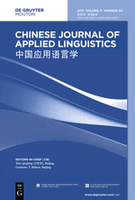
Chinese Journal of Applied Linguistics
Transforming language education through research excellence.The Chinese Journal of Applied Linguistics, published by the esteemed FOREIGN LANGUAGE TEACHING & RESEARCH PRESS, serves as a premier platform for scholars and practitioners in the field of linguistics, specifically focusing on the application of linguistic research in real-world contexts. With an ISSN of 2192-9505 and an E-ISSN of 2192-9513, this journal is distinguished by its position in the Q1 category for Linguistics and Language as of 2023, underscoring its influence and prestige within the academic community. Notably, it ranks 248th out of 1,088 in the Arts and Humanities field and 292nd out of 1,167 in Social Sciences, reflecting a strong percentile rank of 77th and 74th respectively. This journal aims to contribute to the advancement of applied linguistics through innovative research articles, comprehensive reviews, and critical discussions on contemporary issues in language learning and teaching, thereby attracting a diverse readership of researchers, educators, and students who are keen on exploring new linguistic paradigms. With its scope spanning from 2017 to 2024, the Chinese Journal of Applied Linguistics is committed to disseminating cutting-edge insights and fostering dialogues that propel the discipline forward, making it an essential resource for anyone engaged in the study of language and its applications.